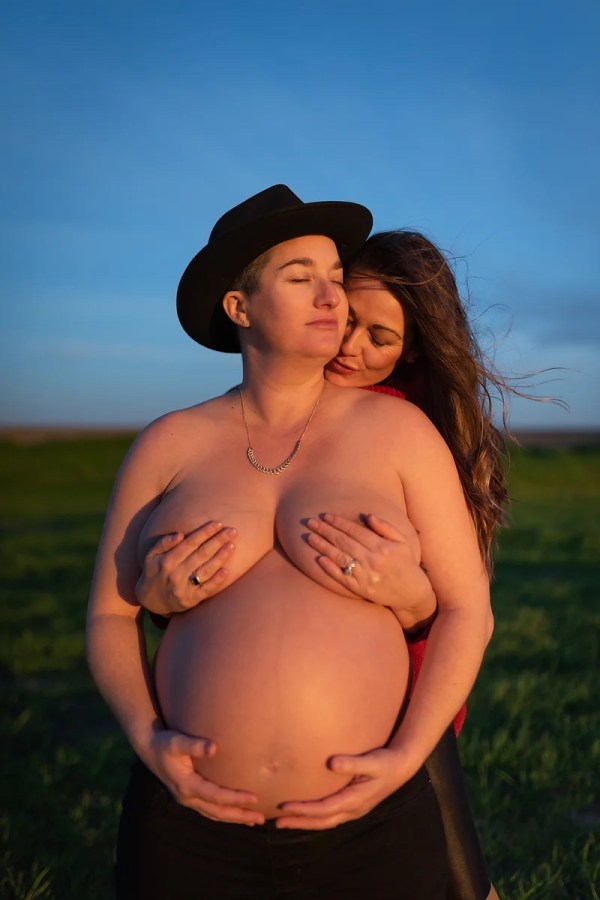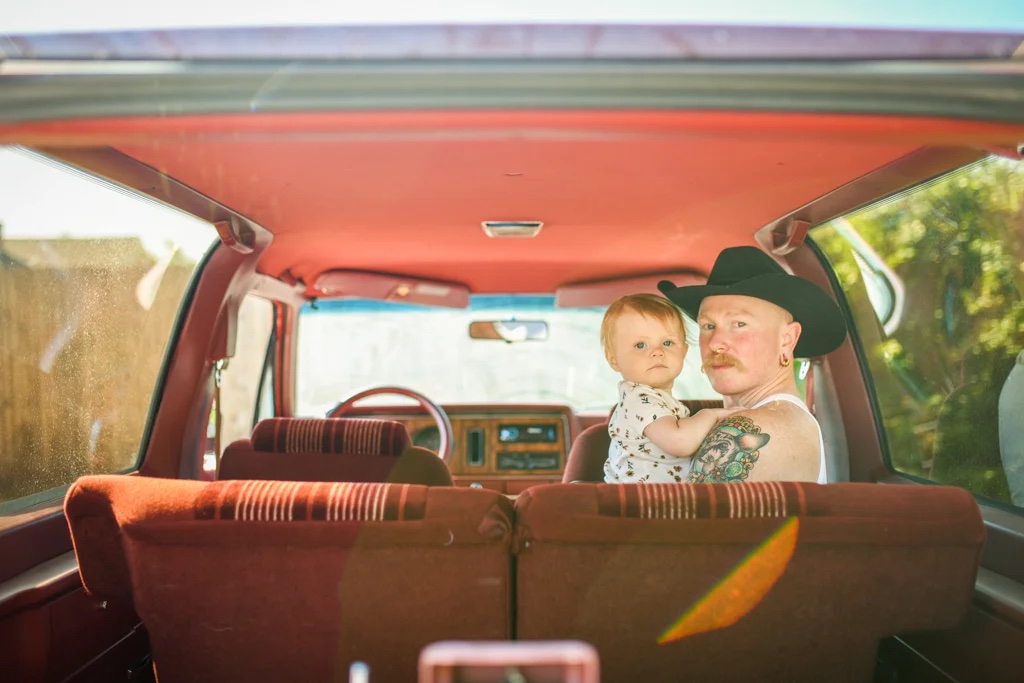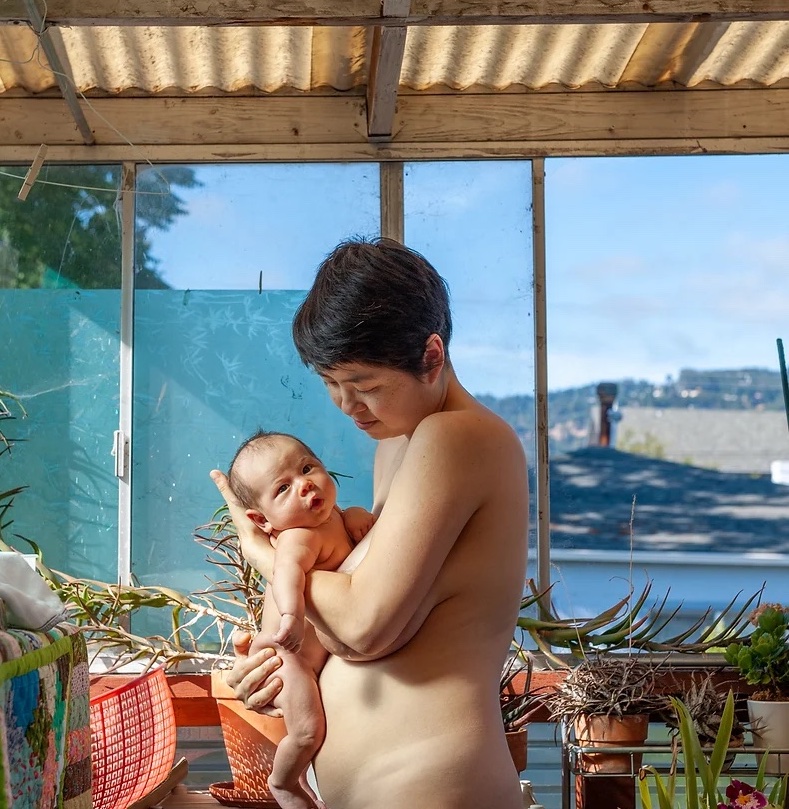feature image photos by Shadi Rahimi and Epli
Anyone who’s gone down the road to becoming a parent knows it can be a rocky one, and for queer parents, it can be a particularly complicated world to navigate. We’re operating within a system that’s not designed for us and is very slowly making space to welcome us.
We need a space where discussing the fears of becoming a non-gestational parent feels more like a comforting chat with friends than a therapy session. We need a space where we can learn more about others’ experiences with choosing donors (known and unknown) and fertility meds, or to get ideas for what we want our kids to call us and our partners. (Some faves that our community sourced include apa, baba, mamo, and zaza!) We desperately need support through the nerve-wrecking two-week-wait after an insemination attempt.
It’s from this need for our own space that PregnantTogether was born — a TTC, pregnancy, postpartum, and parenting community for queer folks and solo parents that has your back through the often dizzyingly overwhelming experience of growing your queer family.

Photo by Epli
PregnantTogether was founded by Marea Goodman, LM, CPM, a licensed midwife and queer parent who works primarily with the LGBTQ+ community. They noticed so many people struggling in isolation while trying to start a family, and felt uniquely capable of stepping up to the plate to fill the gap.
That started with their book, Baby Making for Everybody: Fertility and Family Building for LGBTQ+ and Solo Parents, which they co-wrote with Ray Rachlin (another queer midwife) and published in April 2023.
“When we started writing this book, there hadn’t been a book on queer family formation published in the last 20 years,” Goodman explained during a Zoom interview with Autostraddle. “We just saw this huge need in the community and we wanted to get all the information together and also have it be really accessible—with a strong human component.”
“Over and over, we kept coming back to this theme of how isolated so many of us feel in the process of growing our queer and solo parent families,” they said. “I wanted to create a space to come together around this experience. The pandemic opened up an opportunity to have a virtual community where folks could connect around this very unique but also increasingly common experience of growing our families as queer folks and solo parents.”
Through sharing recorded video content about everything from how to do at-home insemination to what to eat to boost your fertility to how to legally protect your family to why it’s normal to expect to poop while you’re giving birth, the PregnantTogether community offers tons of resources to make your family-building experience easier in all the ways.
“I think the feeling of isolation is endemic to our culture —the way that Western capitalism culture works, we often feel alone in navigating our lives,” Goodman shared. But the isolation of queer parents-to-be face goes even deeper. “As queer folks, a lot of the time we’re not as connected to our families of origin because of homophobia and transphobia, and there’s a strong need for chosen family. Also, the world doesn’t make it easy for us to find the information we need to grow our families.”

Photo by Epli
Goodman has carved out specific spaces within the community to make everyone feel welcome. In addition to the spaces you’d expect, focused on TTC, pregnancy, and postpartum, PregnantTogether also has groups for non-gestational parents (a section “very near and dear to my heart because I’m a birth parent as well as a non-gestational parent,” Goodman explained), solo parents, and BIPOC and mixed race parents. It was important to create these more specifically designed spaces for people to “connect around the unique experiences” these different groups face in their family building process.
Right now, connecting virtually is the only option for the community, which provides access to a wider group of people, including those who live in areas with even more limited options for in-person connections. Goodman is especially committed to providing connections for parents in “Montana or Utah,” who have “maybe one queer competent provider or one fertility clinic in the entire state.”
Goodman uses the PregnantTogether Instagram account to educate followers about health care, something they’re passionate about thanks to their midwifery background. (They also offer one-on-one coaching for queer & solo parents looking to create their families.) “It just blows my mind every time I post a photo of a cervix, so many people are like, ‘Oh my gosh, I didn’t know that they looked like that,’” they shared. “The lack of knowledge that we have about our bodies is really profound.”
“The messaging around menstruation, fertility, pregnancy, and parenting in our culture is strongly gendered. And that can create extra psychological challenges for folks being able to really get a sense of what’s happening inside their bodies, and to see themselves as parents. I want to create a space where every person, regardless of their gender experience, feels like, ‘oh, I can become a parent and these are my options,’ because I do think it’s a reproductive justice issue. We all deserve to grow or not grow our families in the ways that we choose.”
Demystifying birth and the conception process is especially important for queer parents navigating a process that wasn’t designed for us. Fertility treatments, language and research is still focused on heterosexual couples who are having trouble conceiving, rather than those who need help conceiving because of their relationship status. You can find LGBTQ-friendly sperm banks and doctors, but their websites and resources still lack information catered to our needs. Queer parents generally face an onslaught of appointments, tests, expenses and processes they’ve never even heard of before — testing their AMH levels and follicle counts, screening donors based on genetic test results, timing trigger shots — and don’t always have the most useful or appropriate tools to navigate it all.
“I see folks needing support around what level of fertility testing to do or what type of insemination to start with. And then how to get that information, how to find an affirming provider that will actually understand your family and your choices, and support and guidance in getting the care that they need and deserve,” Goodman shared.

Photo by Epli
In the end, many of the challenges that queer parents face all tie back to the fact that we as a society are largely isolated and don’t organically learn about pregnancy. Goodman pointed out that “we don’t grow up in integrated communities where our siblings and cousins and aunties are pregnant and having babies around us.” As a result, the “need for communal knowledge and connection is extra important around this time of our lives.”
That’s why having a resource like PregnantTogether is so important. It opens doors that previously felt closed and empowers the next generation of parents to start their journeys on the right foot—without having to sort through the heterosexist BS in mainstream society or lose your mind in endless Google searches. The answers exist inside us all, we just need to come together to answer them.
As an Autostraddle reader, you get access to this special link that gives you your first month of membership free. You can also learn more on the PregnantTogether Instagram account, @pregnanttogether.community.

Psyched to learn about this! As someone who recently learned that I knew…very little about my own menstrual cycles when reviewing a documentary about periods, I’ve been on a path where I’m dealing with how profoundly uneducated we as a culture are about our own bodies — especially around reproductive health, especially while I consider the possibility of becoming a queer parent at some point in the future. Gonnaaaa have to check this out. (Sa’iyda, did you put this here for me lol?)
What an amazing community and service – needed!!!
Also those photos are stunning
It’s focused on cisgender heterosexual people. I’m a transman who identifies as straight and my wife and I have the same problem
Is this a paid sponsorship post? If it is, it would be nice if you posted that. Thank you.
Still a great resource to hear about.
Never mind! Saw it on the front page, just wasn’t here until the very end.